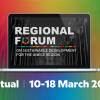Search
Displaying Results 251 - 275 of 308
Today, according to United Nations estimates, the population of the world will for the first time reach the 8 billion mark.
Just 48 years ago, in 1974, our planet was home to four billion people. In less than half a century this has doubled, having passed through the milestones of five billion in
Building resilient energy systems to address the ongoing global energy crisis will be top of the agenda of the upcoming Sustainable Energy Week (19-23 September). Representatives from UNECE's 56 member States will discuss how to ensure energy for optimal social, economic, and
New good practice guidelines for statistical offices have been published by UNECE’s body of experts dedicated to modernizing official statistics. The role of brand management, marketing and crisis communications for Statistical Organisations examines the importance of reputation for producers of
In 2022, international cooperation in energy and critical raw materials is high on the agenda. Optimal use of critical raw materials, for which demand is set to continue rising, will be crucial in delivering the green transition in energy, mobility and the digital world.
This will be in the
Last week, Parties to the UNECE Convention on Access to Information, Public Participation in Decision-Making and Access to Justice in Environmental Matters (Aarhus Convention) gathered alongside representatives of civil society, international organizations, academia, private organizations and other
In view of the upcoming COP 27 of the UNFCCC, taking place in Egypt later this year, the growing threats on climate created by the textile and leather sectors call for our urgent action. If we continue down this path, we will fail by 50% to meet our 2030 emissions reduction targets, resulting in
The textile industry is a key driver of Uzbekistan’s economy, reflected in the country’s rank as sixth largest cotton producer in the world. In 2021, the country accelerated the battle against its child and forced labor violations in cotton harvest according to a new International Labour
As supply chains within the garment and footwear sector are becoming increasingly complex, the need for transparency is more relevant than ever. Consumers, investors and shareholders are pressing for transparent business activities as well as the prevention and mitigation of risks in value chains,
Cities have the power to accelerate the achievement of the 2030 Agenda Sustainable Development Goals (SDGs) through their work at the local level. Examples of this will be presented and discussed at the H22 +50 Session (31 May 2022), and Dialogue of Eminent Experts on smart, sustainable, and
With the UN Food Systems Summit taking place next week under the auspices of the UN General Assembly (23 September 2021), we must recognize that the food systems we have built over recent decades are unsustainable. The food choices we make every day as consumers and producers of food are having a
In 2022, we will celebrate 30 years since the formulation of the Fundamental Principles of Official Statistics and their adoption by UNECE. The Fundamental Principles were subsequently adopted in 1994 by the United Nations Statistical Commission; endorsed by the Economic and Social Council (ECOSOC
When scientists in the 1960s investigated the causes of the die-back of forests, the so-called ‘Waldsterben’, and acidification of lakes with associated fish loss, they found that air pollution, often emitted thousands of kilometres away, was the culprit. This research formed the basis for the
International collaboration facilitated by UNECE is helping statistical organizations around the world move towards producing essential statistics in innovative ways based on machine learning (ML) and artificial intelligence (AI).
The Machine Learning 2021 Group, led by the United Kingdom’s Data
#1 Explore the issues that are on everyone’s mind
One year into the COVID-19 pandemic, the Regional Forum (10-18 March 2021) offers a space to reflect on how the Sustainable Development Goals (SDGs) can guide us to recover better. The spectrum of topics covered at the virtual
Director General of Statistics Finland Marjo Bruun has chaired the Conference of European Statisticians (CES), UNECE’s statistical body, since 2016. As she retires from Statistics Finland at the end of this month, she reflects on how leading this international statistical work has broadened her
Waste has turned into one of humanity’s predominant challenges. The generation of hazardous waste increased from an estimated 259 metric tonnes in 2007 to 394 metric tonnes in 2015; the most significant increases were from lower middle-income and higher middle-income countries and despite policy
As COVID-19 continues to spread across the UNECE region, local governments are on the front lines of addressing this unprecedented pandemic. With the ambition to amplify local solutions, UNECE will bring together mayors from Europe, North America, Central Asia and the Caucasus to strengthen the
The UNECE region is at the forefront of population ageing with rising numbers of people growing old in cities. If at the turn of 21st century just below 14 per cent of urban population in Europe were 65+, they accounted for 16.8 per cent in 2015 and in North America, the proportion of 65+ among
Source: Eurostat – more hereThe COVID-19 crisis has propelled data and statistics into the spotlight. The importance of accurate, reliable and timely data in understanding and managing the crisis has become more apparent by the day, as decision-makers across the world have had to make quick and
To mark the 25th anniversary of the Beijing Declaration and Platform for Action on gender equality, the latest UNECE Policy Brief on Ageing, developed in collaboration with the Government of France, explores the challenges of addressing gender gaps in ageing societies, providing recommendations
In Paraguay, road accidents are the leading cause of death in adolescents and young people aged 15 to 29 – a situation that has got worse over the last five years, according to WHO. The country also leads the list of deaths due to road accidents of motorcycle drivers and their companions in
You want to order online but hate the non-recyclable packaging material used in e-commerce in addition to cardboard? You are a restaurant owner and want to cut down on the dozens of Styrofoam boxes that your fish is delivered in every day? You are thinking of building a house but worry about the
Countries across the UNECE region, and all over the world, will soon conduct censuses of all the people and homes within their borders – an exercise that most countries undertake once every ten years, the next ones being in or near to 2020. These censuses are vital for informing all kinds of
Education is essential to achieving gender equality. From the earliest schooling to the highest levels of post-graduate study, education influences the opportunities that can shape people’s lives. This is why education and training of women is one of the 12 critical areas of concern in the
Tackling inequality between women and men in the sharing of power and decision-making at all levels is essential to strengthen democracy and achieve peace and sustainable development. Back in 1995, this was identified as one of twelve critical areas of concern in the landmark Beijing Platform
















